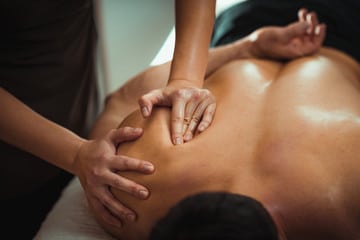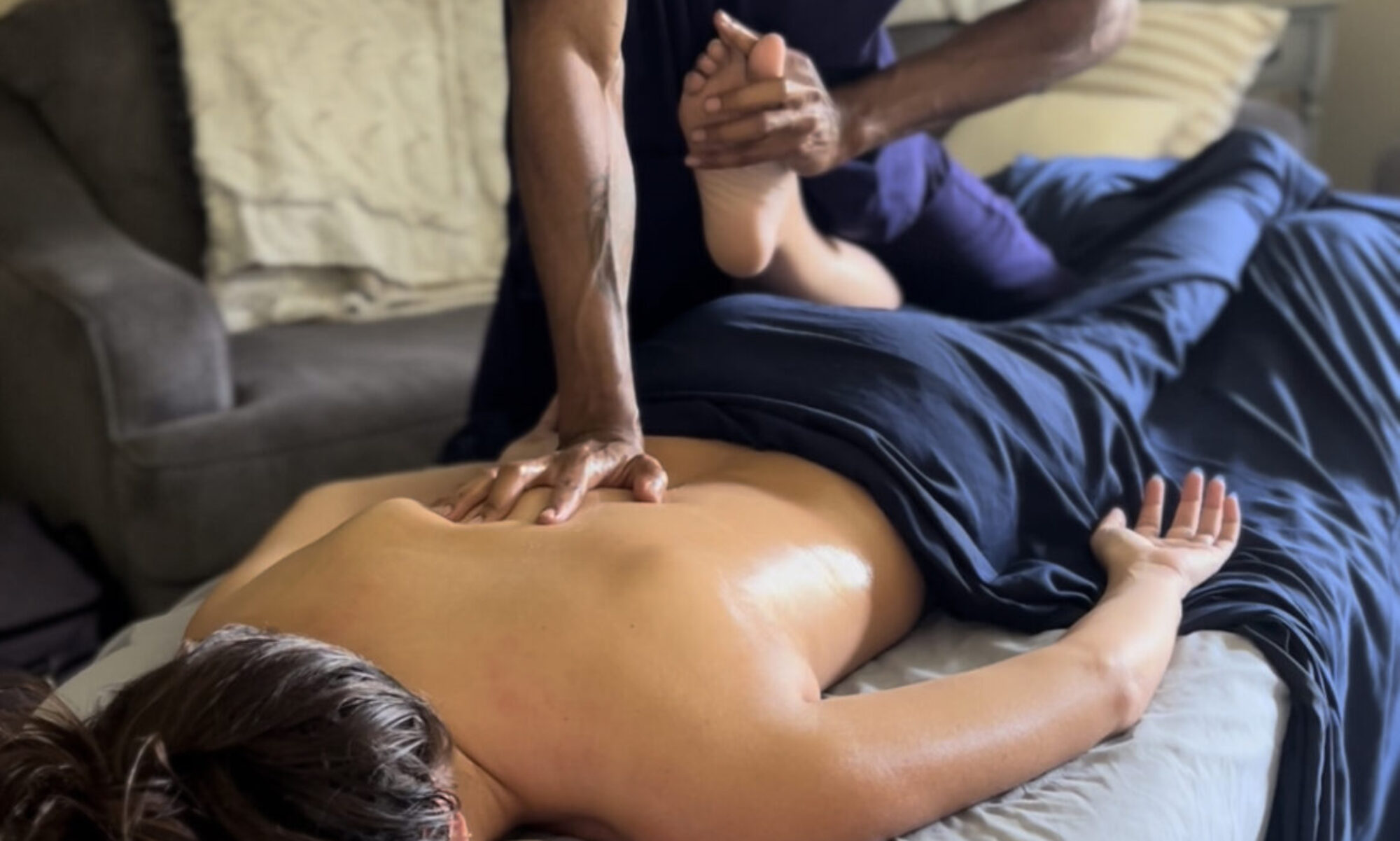Benefits Of Massage Therapeutic Services

Physical Benefits Of Massage Therapy
Aids In Overall Weight Loss
Builds Immunity
Decreases Illness Related Fatigue
Improves Posture
Improves Deep Breathing
Improves Full Body Circulation
Improves Skin Tone
Improves Skin Health
Improves Joint Flexibility
Improves ROM (Range Of Motion) & Mobility
Improves Muscle Tone
Increases Endorphin Secretion (The Body’s Natural Painkillers)
Lowers Blood Pressure
Promotes Digestion
Promotes Better Sleep
Reduces Body Aches & Pains
Relieves Muscle Soreness, Tension, Spasms, And Stiffness
Mental Benefits Of Massage Therapy
Improves Self-Awareness
Improves Mental Alertness
Improves Capacity For Calm Thinking
Improves Body-Mind Connection
Improves Concentration
Encourages/Fosters Peace Of Mind
Encourages/Fosters A Feeling Of Well-Being
Positively Affects Hyper-Deficit Hyperactivity
Positively Affects Post-Traumatic Stress
Relieves Mental Stress
Emotional Benefits Of Massage Therapy
Creation Of New Neural Pathways In The Brain By Releasing Old Muscle/Emotional Habits, Patterns, And Trauma
Decreases Depression
Decreases Anxiety
Grief Work
Improves Anger Management
Increase & Unblock Energy
Regulation Of Respiratory And Nervous Systems
Release Emotional Muscle Memories
Re-Write Old Emotional Patterns
Diseases/Ailments/Conditions Which Are Affected Positively By Massage Therapy
Achilles Tendonitis
AIDS
Allergies
Amyotrophic Lateral Sclerosis a.k.a. Lou Gehrig’s Disease (ALS)
Anxiety
Arm Ache/Pain
Asthma
Bad Posture
Blood Circulation
Bronchitis
Bunions
Bursitis
Cancer
Carpal Tunnel Syndrome
Chronic Fatigue Syndrome
Chronic Lung Disease
Chronic Pain
Circulatory Issues
Claw Toes
Constipation
Depression
Diabetes
Diarrhea
Digestive Disorders
Dislocations
Edema
Eyestrain
False Sciatica
Fibromyalgia
Foot Ache/Pain
Fractures
Frozen Shoulder
Functional Sclerosis
Gastrointestinal Disorders
Golfer’s Elbow
Hand Ache/Pain
Headache/Head Pain
High Blood Pressure
Hip Ache/Pain
Immune System Functions
Insomnia
Joint Mobility
Knee Ache/Pain
Kyphosis
Lateral Epicondylitis
Leg Ache/Pain
Low-Back Ache/Pain
Low Blood Pressure
Lyme Disease
Lymph Circulation
Mallet Toes
Medial Epicondylitis
Mental Awareness
Mid-Back Ache/Pain
Migraines
Mind-Body Connection
Multiple Sclerosis
Muscle Spasms
Myofascial Ache/Pain
Neck Ache/Pain
Numbness
Osteoporosis
Parkinson’s Disease
Plantar Fasciitis
Poor Diet
Post-Surgical Rehabilitation
Postural Distortions
Pregnancy
Psycho-emotional Distress
Range Of Motion (ROM)
Rotator Cuff Syndrome
Scar Tissue Formation
Sciatica
Scoliosis
Shin Splints
Shoulder Ache/Pain
Sleeping Disorders
Spastic Colon
Sports Injuries
Sprains
Strains
Stress
Stroke
TemperoMandibular Joint Dysfunction (TMJ)
Tendonitis
Tennis Elbow
Tension Headache/Pain
Thoracic Outlet Syndrome
Tingling
Toxin Removal
Trigger Finger
Trigger Points
Tumors
Ulnar Neuritis
Upper Back Ache/Pain
Whiplash
What You Can Expect During Your Massage Therapeutic Session
You do not need any special preparations before you get your massage. Before a massage therapy session starts, your massage therapist should ask you about any symptoms, your medical history and what you’re hoping to get out of massage. Your massage therapist may also quickly explain the kind of massage or techniques he/she will use, if asked. In a typical massage therapy session, you undress or wear loose-fitting clothing. Undress only to the point that you’re comfortable. You generally lie on a table and cover yourself with a sheet. You can also have a massage while sitting in a chair, fully clothed. Your massage therapist may perform an evaluation through touch to locate painful or tense areas and to determine how much pressure to apply. Depending on preference, your massage therapist may use oil or lotion to reduce friction on your skin. (Please share with your massage therapist if you might be allergic to any specific ingredients.) A massage session may last from 30 to 120 minutes, depending on the type of massage and how much time you have. No matter what kind of massage you choose, you should feel calm and relaxed during and after your massage. If a massage therapist is pushing too hard, ask for lighter pressure. Occasionally you may have a sensitive spot in a muscle that feels like a knot. It’s likely to be uncomfortable while your massage therapist works it out. But if it becomes painful, please speak up.
**Some forms of massage can leave you feeling a bit sore the next day. But massage shouldn’t ordinarily be painful or uncomfortable. If any part of your massage doesn’t feel right or is painful, speak up right away. Most serious problems come from too much pressure during massage.
Massage Is NOT For Everyone
Most people can benefit from massage. However, massage may not be appropriate if you have:
* Bleeding disorders or take blood-thinning medication
* Burns or healing wounds
* Deep vein thrombosis
* Fractures
* Severe osteoporosis
* Severe thrombocytopenia
Discuss the pros and cons of massage with your doctor, especially if you are pregnant or you have cancer or unexplained pain.

